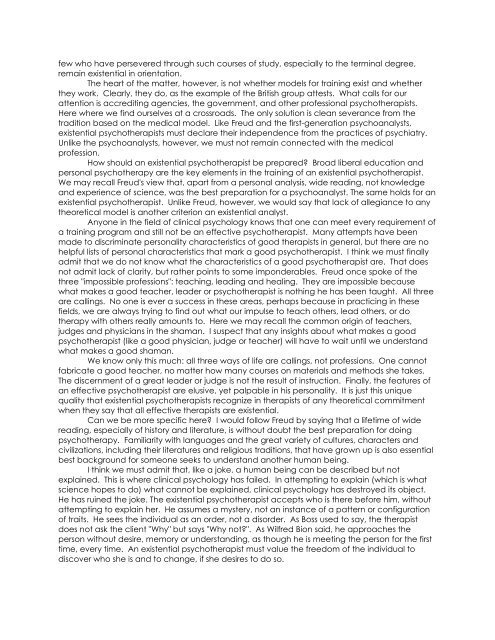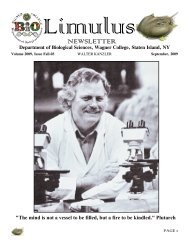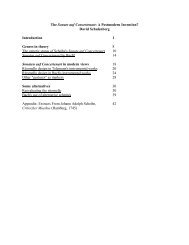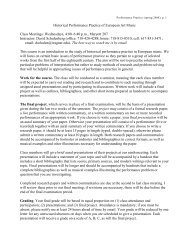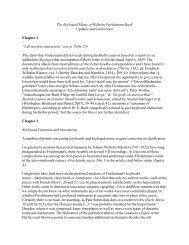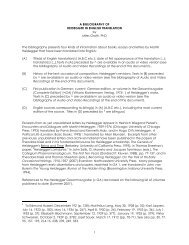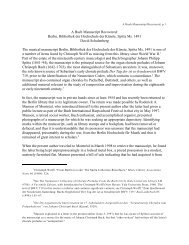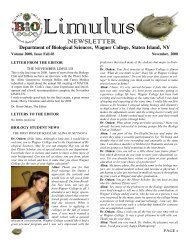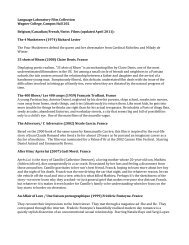SEVEN PAPERS ON EXISTENTIAL ANALYSIS ... - Wagner College
SEVEN PAPERS ON EXISTENTIAL ANALYSIS ... - Wagner College
SEVEN PAPERS ON EXISTENTIAL ANALYSIS ... - Wagner College
Create successful ePaper yourself
Turn your PDF publications into a flip-book with our unique Google optimized e-Paper software.
few who have persevered through such courses of study, especially to the terminal degree,<br />
remain existential in orientation.<br />
The heart of the matter, however, is not whether models for training exist and whether<br />
they work. Clearly, they do, as the example of the British group attests. What calls for our<br />
attention is accrediting agencies, the government, and other professional psychotherapists.<br />
Here where we find ourselves at a crossroads. The only solution is clean severance from the<br />
tradition based on the medical model. Like Freud and the first-generation psychoanalysts,<br />
existential psychotherapists must declare their independence from the practices of psychiatry.<br />
Unlike the psychoanalysts, however, we must not remain connected with the medical<br />
profession.<br />
How should an existential psychotherapist be prepared? Broad liberal education and<br />
personal psychotherapy are the key elements in the training of an existential psychotherapist.<br />
We may recall Freud's view that, apart from a personal analysis, wide reading, not knowledge<br />
and experience of science, was the best preparation for a psychoanalyst. The same holds for an<br />
existential psychotherapist. Unlike Freud, however, we would say that lack of allegiance to any<br />
theoretical model is another criterion an existential analyst.<br />
Anyone in the field of clinical psychology knows that one can meet every requirement of<br />
a training program and still not be an effective psychotherapist. Many attempts have been<br />
made to discriminate personality characteristics of good therapists in general, but there are no<br />
helpful lists of personal characteristics that mark a good psychotherapist. I think we must finally<br />
admit that we do not know what the characteristics of a good psychotherapist are. That does<br />
not admit lack of clarity, but rather points to some imponderables. Freud once spoke of the<br />
three "impossible professions": teaching, leading and healing. They are impossible because<br />
what makes a good teacher, leader or psychotherapist is nothing he has been taught. All three<br />
are callings. No one is ever a success in these areas, perhaps because in practicing in these<br />
fields, we are always trying to find out what our impulse to teach others, lead others, or do<br />
therapy with others really amounts to. Here we may recall the common origin of teachers,<br />
judges and physicians in the shaman. I suspect that any insights about what makes a good<br />
psychotherapist (like a good physician, judge or teacher) will have to wait until we understand<br />
what makes a good shaman.<br />
We know only this much: all three ways of life are callings, not professions. One cannot<br />
fabricate a good teacher, no matter how many courses on materials and methods she takes.<br />
The discernment of a great leader or judge is not the result of instruction. Finally, the features of<br />
an effective psychotherapist are elusive, yet palpable in his personality. It is just this unique<br />
quality that existential psychotherapists recognize in therapists of any theoretical commitment<br />
when they say that all effective therapists are existential.<br />
Can we be more specific here? I would follow Freud by saying that a lifetime of wide<br />
reading, especially of history and literature, is without doubt the best preparation for doing<br />
psychotherapy. Familiarity with languages and the great variety of cultures, characters and<br />
civilizations, including their literatures and religious traditions, that have grown up is also essential<br />
best background for someone seeks to understand another human being.<br />
I think we must admit that, like a joke, a human being can be described but not<br />
explained. This is where clinical psychology has failed. In attempting to explain (which is what<br />
science hopes to do) what cannot be explained, clinical psychology has destroyed its object.<br />
He has ruined the joke. The existential psychotherapist accepts who is there before him, without<br />
attempting to explain her. He assumes a mystery, not an instance of a pattern or configuration<br />
of traits. He sees the individual as an order, not a disorder. As Boss used to say, the therapist<br />
does not ask the client "Why" but says "Why not?". As Wilfred Bion said, he approaches the<br />
person without desire, memory or understanding, as though he is meeting the person for the first<br />
time, every time. An existential psychotherapist must value the freedom of the individual to<br />
discover who she is and to change, if she desires to do so.


